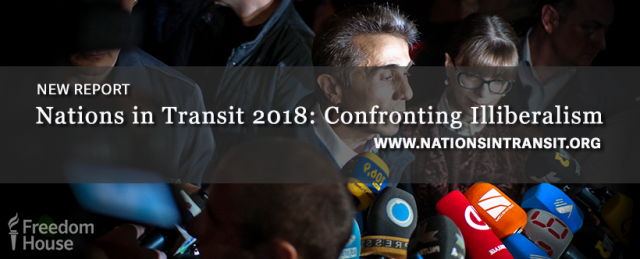Georgia Heading in the Wrong Direction Warns Freedom House
With the not so subtle plastering of Bidzina Ivanishvili on their Facebook cover photo to mark the announcement, Freedom House has released its new report “Nations in Transit 2018: Confronting Illiberalism”. The report offers a country-by-country analysis of the progress and setbacks for democratization in post-Soviet states, along with the other European former communist countries.
According to the report, Georgia’s democracy score worsened in 2017 in comparison to previous years, with it’s overall score now at 4.68 compared with 4.61 in the 2017 and 2016 reports, and 4.64 in 2015.
The ratings are from a scale of 1 to 7, with 1 representing the highest and 7 the lowest level of democratic progress. Said scores are a reflection of the consensus of the authors of the country report, Freedom House and its academic advisors. The overall score comprises an average of ratings for separate categories: national democratic governance; electoral process; civil society; independent media; local governance; judicial framework and independence; corruption. Scores Georgia in all of these categories remained unchanged with the exceptions of independent media and judiciary, where the country experienced a decline of 0.25 in both.
“In Georgia, billionaire Bidzina Ivanishvili stepped down as prime minister after one year in 2013, but he retains control over the ruling Georgian Dream party, which features employees of his companies in its highest ranks. Ivanishvili’s political vendettas and development plans for the capital Tbilisi continue to loom over Georgian politics”, reads the overview of the report.
Meanwhile, the country-specific report on Georgia states that 2017 “was, overall, a period of slight setbacks for Georgia’s democratic development. Georgian authorities found it difficult to strike a balance between the contradictory goals of advancing democratization on the one hand and consolidating power on the other.”
“The trend of half-hearted democratic reforms that started after the 2012 elections has stalled in recent years. Georgia’s democratic transformation will remain incomplete so long as the priorities of the country’s ruling elites are split between democratization and staying in power,” it continued
The report also states that the decline in the Independent Media rating is the result of “apparently politicized editorial policies at Georgian Public Broadcasting, continuing pressure on the critical television channel Rustavi 2, and ownership consolidation among pro-government private television stations.”
While the decline in the Judicial Framework and Independence category is due to the “illegal deportation of dissident Azerbaijani journalist Afgan Mukhtarli to Azerbaijan and a high-profile case in which a foreign company faced punitive fines after a deeply flawed judicial process.”
The report added that while Georgian Dream are usually receptive to public and international concerns, as a semi-democratic regime, they will yet face some issues: “While GD often put party interests ahead of the need for democratic reforms in 2017, the authorities never crossed any redlines and pulled back in most cases when they encountered strong domestic and international resistance. … However, in the future, GD will face the dilemma of conflicting interests that is characteristic of most semi-democratic regimes: Genuine consolidated democracy would ultimately endanger its grip on power,” the report said.
With regards to the outlook for 2018, the report states that
“Georgia will not experience any political earthquakes in 2018. The year will be shaped by the upcoming presidential election, which will mark the last time a Georgian president is directly elected by the people. However, after the recent constitutional amendments, the president’s powers have dwindled further, and the ruling party has the ability to overturn presidential vetoes through its parliamentary supermajority. Therefore, even in the rather unlikely event that an opposition candidate wins the presidency, the presidential election will not substantially change the political balance in the country.”
Adding that it “remains to be seen whether opposition parties can stem their trend of fragmentation and close ranks in preparation for parliamentary elections in 2020. For GD, which has mastered the craft of popular semi-democratic politics, the main challenge in 2018 will be tackling the economic and social hardship that feeds public dissatisfaction more than any political issue. The crumbling of the safety net that GD carefully established after 2012 may erode the party’s public support and reduce its chances in the 2020 elections. Georgia’s civil society will continue exerting its influence in political processes throughout 2018, but it is unclear whether Georgia’s media landscape, which suffered from political interference in 2017, will recover in 2018.”
By Máté Földi
Photo: Freedom House












